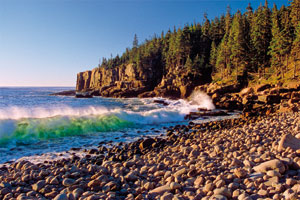Summerguide 2016 | view this story as a .pdf
You may have been told what Acadia is, but it’s much more vast and much more inclusive than many of us imagine.
By Colin W. Sargent
 Most Mainers and visitors think of Acadia as simply Acadia National Park near Bar Harbor. It’s an exquisite jewel parkland of 74.15 square miles, underwritten by the Rockefeller family (mindful of the sweeping views, environmental benefits, and infinite tax-write-off possibilities). In today’s relaxed geography, a softer definition of Acadia might venture to the borders of Mount Desert Island. That’s because that larger sense of “Acadie” has been endangered for over 400 years. That’s right, Acadia is shrinking.
Most Mainers and visitors think of Acadia as simply Acadia National Park near Bar Harbor. It’s an exquisite jewel parkland of 74.15 square miles, underwritten by the Rockefeller family (mindful of the sweeping views, environmental benefits, and infinite tax-write-off possibilities). In today’s relaxed geography, a softer definition of Acadia might venture to the borders of Mount Desert Island. That’s because that larger sense of “Acadie” has been endangered for over 400 years. That’s right, Acadia is shrinking.
The earlier, more cosmopolitan sense of Acadia has been diminished summer by summer, year by year, because of English conquest and, frankly, Francophobia.
Before there was a Bar Harbor, the lost settlement of Saint-Saveur, a Jesuit mission, was the dreamy capital of Mount Desert Island.
In the deadly raid of 1613, English forces swept over the Jesuit mission. Samuel Argall (who captured and imprisoned Pocahontas) led the bloody attack, resulting in the murder of Saint-Saveur founder Brother Gilbert Du Thet (1575-1613), killing many others in the process.
The vanishing of Acadia had begun. Conquering historians are experts at forgetting.
Best not to say Acadie above a whisper. It sounded so French, an unpleasant reminder of what the English did to wrest control of the area. Faster than quicklime erases the traces of a dead body, Acadia began to lose traction. But rest assured, before this attack, Acadia was a real and not a fabled place, its incomprehensibly vast dominions extending “roughly between the 40th and 50th parallels,” according to period documents from the French government. Its inhabitants included tribes of the Wabanaki Confederacy and French settlers, the Acadian people who would later be deported by the British during the French and Indian War. Some of them made it to New Orleans, where they would become known as “Cajuns,” the very term Cajun a bastardization of “Acadian.”
Turns out, we’re all Acadians
When you talk about the 40th parallel and north, you’re including a sweep from New Jersey right up the coast into Canada. This was New France, more particularly Acadie. Turns out, Acadia isn’t just a park, it’s a mind-dazzling coastal spirit.
Going through the Portland public school system, I was never told about the English raid on Saint-Sauveur. Instead, we learned how horrible it was for the English to have expelled the fictional Evangeline from her home, which thankfully was in Canada, so we United States survivors of the British narrative didn’t have to feel guilty about it. This shrinking maneuver kept Acadia out of Maine entirely, but for the nominal coincidence of tiny Acadia National Park.
This wiping out of Maine’s Frenchness, not to mention its pre-existing Wabanaki identities, is at the bottom of this feature story. At the top of it is fun, because to understand Acadia is a chance to know the place you love as never before.
What’s in a Name
To chart the evolution of popular understanding, consider: “The origin of the designation Acadia is credited to the explorer Giovanni da Verrazzano, who on his 16th century map applied the ancient Greek name ‘Arcadia’ to the entire Atlantic coast north of Virginia…” according to Wikipedia.
“Arcadia derives from the Arcadia district in Greece which since Classical antiquity had the extended meanings of ‘refuge’ or ‘idyllic place.’ The site goes on to quote from The Dictionary of Canadian Biography: “Another interesting note is the similarity in the pronunciation of Acadie and the Míkmawísimk suffix –akadie, which means ‘a place of abundance.’ The modern usage is still seen in place names such as Shunacadie (meaning: place of abundant cranberries) or Shubenacadie (meaning: place of abundant wild potatoes). It is thought that intercultural conversation between early French traders and Mi’kmaq hunters may have resulted in the name ‘l’Arcadie’ being changed to ‘l’Acadie.’”
Just as a river has a portage, this story has a takeaway: The magic of Acadia and its original geography sweeps across time and culture to include a coastal region extending far beyond Acadia National Park. Originally, this sense of Acadia extended all the way to Virginia. It’s a bit mind-bending to ponder that you can be both “from away” and still from Acadia at the same time. Acadia is a beautiful word, a growth stock. The term is yours to chase if you want it.





0 Comments